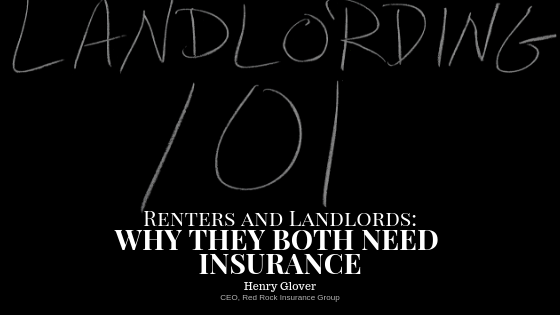I can’t say enough about Henry Glover. He was fantastic. He answered all of my questions and helped me with some insurance for my grandmother also. He even told me that she should stay where she is because he couldn’t get her a better deal. He put our needs above his needs…Overall this was just an incredible experience and a breath of fresh air after the last agent I was dealing with. I will be recommending him to everyone I know and look forward to a long business relationship with him. Thank you!

Technology’s Overarching Impact on the Insurance Industry
New technological advancements can lead to improvement in efficiency, customer service, data collection and more. Although some people believe the insurance industry is lagging behind other industries in terms of innovation, that’s not entirely the case. “Insurtech” is a term being used to describe the new technologies that are aiming to modernize the insurance sector.
Apps and Mobile Technology
Smartphones and nearly constant internet access have allowed for more consistent communication with a wider audience of insurance customers. For example, apps and text messaging can be used to inform people of important reminders and updates to their insurance. In addition, people nowadays have a camera on them at all times, which wasn’t true a few decades ago. This means they can snap pictures of any damage that needs to be sent to their insurance company, making the claim process quick and efficient.
Blockchain
The purpose of blockchain is to provide a shared, encrypted database of information and transactions. It’s projected that executives in the insurance industry will be doubling their blockchain investments this year. There will be obstacles to overcome in the implementation process, but blockchain shows promise for increased transparency, accountability and security, saving time and money while also improving customer satisfaction.
Artificial Intelligence
With AI, algorithms are designed to achieve specific tasks, and these machines can often “learn” on their own. This eliminates the need for a programmer to consistently add new code and information. AI research is being done in fields like reasoning, natural language processing, planning, and more. In the insurance industry, this technology is often being used for quotes, calculating policy offerings, monitoring, and understanding client needs.
The Sharing Economy
Services like Uber, Lyft and Airbnb are household names in today’s society. However, these ridesharing and homesharing services are commercial, thus requiring certain insurance. There have been major improvements in the insurance coverage recently, but there are still unique challenges. For example, there is a potential gap in commercial coverage for an Uber driver where their personal auto insurance may need to cover an incident.
Research shows that millennials prefer digital solutions for all transactions, including insurance. As this age group is now one of the largest in the United States and many are entering their highest consumption period, we must make their needs and preferences a priority. However, we must do this while still remaining accessible to the less tech-savvy older generations who may be less likely to adapt to (and trust) widespread changes in the industry.

Renters and Landlords: Why They Both Need Insurance
As with most residential properties, a rental property is comprised of two basic components: the property itself and the items inside. The property itself is the landlord’s responsibility, but each individual renter is responsible for their items. This is why it’s essential for both the landlord and the tenants to have their own insurance policies.
Landlord Insurance
Landlord insurance typically covers three types of losses:
- Property damage, such as damage to a property’s structure from fire, wind, hail or snow. It will also cover personal property, such as appliances and furniture left for tenant use.
- Liability coverage for legal protection if a tenant is injured on the property
- Loss of rental income if the property is uninhabitable due to fire, etc.
The insurance can also be customized to protect landlords against other unexpected situations.
Landlord insurance is similar to traditional homeowners insurance, but it is specifically tailored to the needs of a property that will be leased. If you have long-term renters, landlord insurance is a necessity. If you only have short-term renters who live in your primary residence for short periods of time, that may be protected by your existing homeowners insurance policy. However, the insurer must be made aware of the situation to confirm. Someone who frequently rents out their primary residence (through Airbnb, for example) may be considered a business owner by their insurer, meaning they’ll have to purchase a commercial insurance policy instead of traditional landlord insurance.
Renters Insurance
Renters should never assume that a landlord’s insurance is sufficient. For example, landlord insurance won’t cover any of the tenant’s property that is damaged in a fire, flood, etc. A tenant should especially be concerned about renters insurance if they plan to entertain guests. The tenant is legally responsible for any guests who are injured on the property.
Typical renters insurance will cover personal liability, theft, and personal property damage caused by natural disasters. Similar to landlord insurance, renters insurance can also be customized. However, it will likely not protect the renter from accidental loss of their own items, damage from their pet, and a roommate’s valuables. Each tenant needs their own insurance policy to protect themselves.
Some landlords may require that their tenants obtain renters insurance. Even when that isn’t the case, renters should do their due diligence to protect themselves and their belongings.
Whether you’re the landlord or the tenant, the right insurance can offer protection when something goes wrong. Even a clean property with up-to-date repairs isn’t immune to things like injury, natural disasters, theft and subsequent claims.

A Deep Dive into Umbrella Insurance
Umbrella insurance — sometimes called excess liability insurance — is not a requirement like car insurance or homeowners insurance. Instead, it’s like an extra security net that protects against the unexpected things in life. For example, anyone can find themselves in an expensive lawsuit that diminishes their current savings and puts them in debt for years to come.
Umbrella insurance can be especially beneficial for people with certain jobs, hobbies or property. Someone may want to consider picking up umbrella insurance if they:
- Participate in activities that increase their chances of being sued
- Own a trampoline, pool or dog (all of which could potentially injure visitors)
- Have a high net worth or significant savings and assets
- Are employed or expect a high earning potential
- Own or rent property
Don’t assume that just because you don’t have a million dollars in assets that an umbrella is unnecessary. The goal of an umbrella policy is to protect existing assets and your future earning potential from liability claims against you that would be covered under an umbrella policy.
Buying Umbrella Insurance
Umbrella insurance is relatively inexpensive for the value. With a coverage limit that starts at $1 million, it’s nice cushion from the start. The average cost could be $150-$300 per year for $1 million in coverage, but the rates vary by insurer, your risk history, and the assets that you are insuring. Most umbrella carriers will write coverage up to $5 million, but you can go significantly higher based on your needs and underwriting approval.
There are some requirements for umbrella insurance. You’ll first have to carry auto and property insurance to qualify. You’ll also need to make sure that have the minimum amount of liability on those policies before umbrella coverage can be added. Your insurance agent will be able to advise and structure your policies with the appropriate coverages and discounts.
What It Covers
Umbrella insurance covers a variety of costs, but can slightly vary by insurer. It pays for legal defense costs, as well as another person’s property damage, injury treatment or funeral costs. It can also cover lawsuits that involve libel, slander and defamation of character. Umbrella insurance is especially valuable for landlords because of the liability tied to renting a property that you own.
It’s also important to note that there are certain things the insurance won’t cover. For example, intentional and criminal acts will not be paid for by umbrella insurance. It also won’t cover injuries or damage that your business is liable for, your own injuries, or damage to your own belongings.
How Much Umbrella Insurance You Need
It’s recommended that you buy enough umbrella insurance to cover your net worth, including your savings and other assets. For anyone sure they’ll be earning a significant pay raise in the near future, potential income could also be factored in.
Whether we like to admit it or not, accidents happen and things go wrong. Insurance is a way to safeguard against some bumps in the road we don’t plan for. An insurance agent can help you decide if umbrella insurance is a wise purchase. For many people, the peace of mind and increased financial security are definitely worth their while.
About Henry Glover
Henry Glover of Birmingham, Alabama, is the Founder and CEO of Altasurance (formally known as Red Rock Insurance), an independent insurance agency servicing clients with a variety of insurance needs. From auto insurance to life insurance, Henry Glover has crafted a team of agents to offer expert-level support and direction for your insurance inquiries. Henry founded the insurance group in 2009 and has built it to reach within several local markets. The small team of under a dozen employees is currently expanding as their success continues to grow.
Henry didn’t always know that the insurance industry was where he would build his legacy. From a young age, Henry Glover knew that he wanted to be successful. He never cared if he started a soap factory or an insurance agency, he just wanted something he could call his own. Henry didn’t know soap, but he did know insurance, so he went with insurance.

Educational Journey
Henry’s entry into the insurance industry was a bit of a roller coaster. He began school at Auburn University, studying software engineering. He loved software but hated school, so he decided to drop out even though his parents were paying all the costs. They were obviously irritated, and immediately cut him off from their payroll and stopped paying his out of state tuition. To find a job, Henry responded to an ad in the classifieds (back when the classifieds were a thing), and applied for a job selling insurance. Little did he know, the job was selling life insurance door-to-door. But Henry had to make ends meet, so he stuck with it and ended up being very successful. Henry Glover quickly became one of the top producers in the state, but realized that the business model and the job were not sustainable for his future.
Being the salesman that he is, Henry Glover made a deal with his parents that he would go back to school. This time, he decided to take out student loans, as he had been out of school long enough to qualify and get in-state tuition. The deal was that if Henry successfully graduated, his parents would have to pay off his student loans. It was a win-win situation as Henry took all the risk should he decide again that school wasn’t for him. In reality, Henry didn’t really didn’t care about college, but his parents did. They were thrilled at the prospect of rewarding their son after graduation.
However, there was a problem. Henry was basically having to work his way through school because student loans didn’t pay for everything. He worked for an insurance agency that specializes in Property and Casualty Insurance (different from what he does now with Auto, Home and Commercial Insurance). The problem was what he called the “student salesman dilemma” — as he worked on commission only, he often had to decide between closing a sale or studying for a test. He always wanted to close the sale, but he was on the hook for his school loans if he didn’t pass the class. You see, both had a economic cost/benefit and it was too hard to choose. Barring this realization, Henry did the responsible thing and quit his insurance job to take an hourly job, first as a cook, and eventually in a jewelry warehouse. But working for that insurance agency did set the groundwork for what eventually became his insurance agency’s business model.
Henry Glover finally graduated from college in 2006 with a degree in Economics and a minor in Computer Science, making his parents proud…and leaving them with the student loan bill.
Career
After college graduation, Henry Glover of Birmingham, Alabama, pursued a career in the banking industry, but he didn’t quite receive the same thrill that he experienced when selling insurance. He always knew he would get back into insurance, it was just a question of how.
After about 2 years of gaining sales and service skills through his banking position, Henry decided he wanted to create his own success from the ground up. He spent time getting to know his bank clients who owned businesses, learning from their success and failures and finding out what he would be getting himself into. With an entrepreneurial spirit and a passion for the challenge on his mind, Henry Glover went back to the industry he knew best — with a few extra skills that would help to set him up for success.
Henry Glover has been working in the insurance industry long enough to know that times are changing. The world is becoming digital, and 75% of the insurance market is run by a combination of ‘captive’ and ‘direct’ insurance carriers. ‘Captives’ are large local sales forces like Allstate, Nationwide, State Farm, etc., and the ‘directs’ are companies that bypass a sales force and sell directly to the consumer (i.e. Geico, USAA, etc.).
However, Henry doesn’t bat an eye when it comes to worrying about his competitors. Because there will always be a demand for those larger entities, he chooses to focus on the nuances within the rigid insurance industry in order to set Red Rock Insurance Group apart from others. Red Rock knows insurance, and Henry knows that customers are most satisfied when there is a happy mix of both digital and traditional practices within their business model.
Having a knack for technology, Henry Glover has also become quite the experienced programmer. He’s developed several pieces of tech, not only as a hobby, but for his company as well. In his spare time, Henry enjoys educating himself on various technical aspects of development and invention. This draw to technology has been passed down to his 8 year old daughter as well, who loves bonding with her father over the subject.
Henry Glover currently resides in Birmingham, Alabama. Red Rock Insurance Group continues to grow and reach new audiences, and expand upon their successes so far. For more information about Henry Glover and Red Rock Insurance Group, stay tuned to his blog featured here.